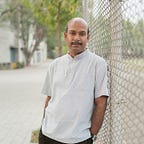स्वविमर्शः पुरुषार्थः
svavimarśaḥ puruṣārthaḥ
This sentence from Paraśurāma Kalpasūtra (1.6) gives a deeper meaning of Puruṣārtha or the object of human pursuit. It says that to deliberate and know oneself is the supreme object of life.
The Gita (4.38) says न हि ज्ञानेन सदृशं पवित्रमिह विद्यते, which means there is no purifier in this world than knowledge. But there is knowledge and knowledge and knowledge. All the different kinds of knowings are necessary for a conscious and fruitful living in this world. Even though these knowings facilitate an intelligent and effective living but still this is not adequate to solve all kinds of problems of one's existence. We find in the Upanishad Narada approaching Sanatkumar with the aspiration of learning from him the secret of overcoming all difficulties. Even though Narada had learnt almost all Shastras and had knowledge of many things still he did not find happiness in him. Here we learn from the realisations of the seers and sages that the ultimate knowledge is the knowledge of one's own Self. Without this knowledge there is no lasting peace and happiness. Therefore, one must turn inward and scrutinise what is the core of all that constitutes one's existence. One must entirely be oriented towards the discovery of this basic truth of one's being - the Self. This indeed holds the key to life. To know oneself is to know the meaning and direction of all movements of life.
आत्मा वा अरे द्रष्टव्य: श्रोतव्यो मन्तव्यो निदिध्यासितव्यो (Brihadaranyaka Upanishad, 4.5.6) It is the Atman that is to be known, to be heard about,to be thought in the mind and to be meditated upon. Indeed, this is the thing knowing which all is known.
Self-reflection for the purpose of knowing oneself and growing from within is a necessary tool for attaining Self-knowledge.
The ultimate goal of human life is to grow from the state of man-animal to man-human, to become man-divine. For this the man must realize that there are many things in his nature which are that of animals and need to be transformed in order to become man-human. It is only then that he can grow into the state of man-divine and create a Divine race. The Rigveda (10.53.6) confirms this by saying, मनुर्भव जनया दिव्यं जनम् manurbhava janayā divyaṃ janam, ‘become man and create the Divine race’. For creating the Divine race the first condition for the man then is to realize his man-ness and grow to become a man-human. What then, for the man, is the simplest way to grow conscious of one’s own state of being? The scriptures say: ‘reflection on the movements of one’s own nature’. There is a beautiful verse in the Subhashita Ratnabhandagara which says that every day each human being should carefully reflect on himself and see whether he was a good human being today or did he stoop down and behave like an animal.
प्रत्यहं प्रत्यवेक्षेत नरश्चरितमात्मनः।
किं नु मे पशुभिस्तुल्यं किं नु सत्पुरुषैरिति॥
pratyahaṃ pratyavekṣeta naraścaritamātmanaḥ.
kiṃ nu me paśubhistulyaṃ kiṃ nu satpuruṣairiti..
- subhāṣitaratnabhāṇḍāgāra
It is indeed, everyday, every one of us keeps doing something that is stupid, childish and even brutal. Self-reflection is very much necessary for us not only to recognise this stupidity but to bring a change in that and to see that we do not repeat the same next time. There are those who do not bother reflecting. There are others who do reflect and know that they have this animal tendency in them but hardly care to bring any change in that. There are still others who reflect, recognize and know the consequence of it still keep repeating the same when there is an opportunity for the same mistake to occur. But, there are very rare ones, who sincerely aspire to bring a change in them in order to grow inwardly.
Those who do not reflect they fall back and do not grow to become true human beings. The change must come, first, within oneself. So, Self-reflection is the first condition for the inner growth, for bringing the change in oneself. It is one of the most powerful means to become aware of oneself. One must grow conscious of one’s own state of being to bring the change in him. That’s the way. It’s must for everyone aspiring change in him to find out the elements within that need to change, to recognize the mistakes in oneself and to regard the faults in others as reflections of his own.
‘He who is aware of his own faults and is ashamed of them is qualified to be the teacher of the world’, says the Mahabharata. {यः आत्मना अपत्रपते नरः स सर्वलोकस्य गुरुर्भवत्युत yaḥ ātmanā apatrapate naraḥ sa sarvalokasya gururbhavatyuta} (Mahabharata, Udyoga Parva, 3.121)
But, at the same time, Self-reflection does not mean to reflect on the mistakes and errors that one keeps committing. Too much concentration on the flaws, errors and mistakes is also not good. One also has to become aware of all that is good in him and make effort to enrich those good qualities. Ultimately one has to grow conscious of the presence of the Self, the Real Essence within, to live that presence and to act in its light.
